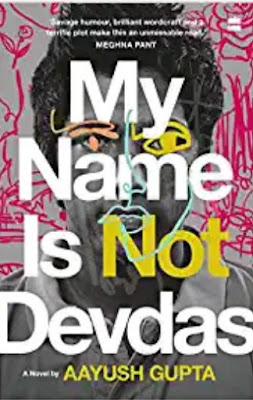My Name is Not Devdas
Book Review
Title: My Name is Not Devdas
Author: Aayush Gupta
Publisher: HarperCollins
India, 2022
Pages: 155
The original Devdas story was written a century ago
when the world was quite different. In today’s post-truth world, where
nationalism and many other similar isms are nothing more than political
gimmicks, where every slogan has an equally engrossing anti-slogan, and where
love is little more than veiled selfishness, old-style romance has no place. Love
becomes all the more an alien thing on the campuses in the country’s overly
political capital city.
Aayush Gupta’s slim novel is set in
Delhi and most of the story unfolds on the campuses of Delhi University and the
Jamia Milia. In the background, we can hear the slogans of both the
nationalists and the anti-nationalists: Goli maaro saalon ko! and Azaadi!
Azaadi! The 21st-century Devdas, Paro and Chandramukhi belong
there on those campuses.
Devdas came to Delhi from Kolkata
where his father, Professor Narayan Mukherjee, was teaching in Jadavpur
University until a female student filed a sexual abuse charge against him. The
prof is a Marxist, feminist and an eminent scholar. His son has inherited most
of his qualities. But Devdas will turn out to be pseudo of everything:
pseudo-feminist, pseudo-Marxist, and pseudo-poet. After all, he lives in a
country of pseudos.
Paro hails from a poor family in
Haryana. But she was adopted by Prof Mukherjee when his wife ran away with a local
cable guy. The Prof wanted to prove to the society that he was indeed a good
man. One of the good services he performs is to adopt a poor girl. The poor
girl becomes a live toy for Devdas. The Communist Devdas becomes a possessive
Communist. But Paro knows how to get on in life in spite of the two fake men in
her life: her adoptive father and her adoptive brother. After all, she lives in
a country of millions of fake men.
Chandramukhi is from Kashmir. Like
many people do in that state, her parents too disappeared. She studies in Jamia
Milia and meets her expenditure by selling her body in the red street. Prof
Mukherjee is one of her many clients. Devdas too will be one in due course of
time.
Devdas can be anything anywhere
because he does not have an identity of his own. His name is Not Devdas.
So are the other two major characters. They are Not Paro and Not
Chandramukhi. How many people in this country, where the everyday voter has to ignore
truths easily in order to survive, are really themselves today? Can we afford
to be ourselves?
Devdas burnt the Manusmriti
when he was in Kolkata. He called the upper caste people pigs. But in Delhi,
when the regime changes and the caste does matter, Devdas displays his Brahmin’s
sacred thread proudly. The erstwhile feminist Devdas will now become an
assaulter of women. India is now different and it changes Devdas too. “The chaddis
have begun a Swadeshi movement. Buying only Indian products. To protect our
culture.” And Bushy Baba, a “monk who sold everything and became a billionaire”
is the flagbearer of this new India. [All quotes are from the novel.]
The novel is narrated from the points
of view of the three major characters. They tell their own stories and the
reader puts them together. The denouement is superb and fast-paced too. Aayush
Gupta is a screenwriter and this little novel has the gripping quality of a
thriller movie especially in the second half.
The India we witness in this novel –
though only Delhi is seen mostly – is not the kind of place we would like to live
in. Somewhere in that India, in the red streets, you can see a better place
probably, a place where “a Nepali, a Bangladeshi, a Kashmiri, a Sikh and a
Hindu live in the same house, work for the same pimp – united by the fact that
each of them needed to eat, and by their willingness to get screwed every day
to be able to.” There is hope still!
There is more sarcasm in the novel.
Go ahead and read it if you want to see India through a different lens. It is
worth a read, no doubt.
Buy your copy of the novel here.
PS. This review is powered by Blogchatter Book Review Program





Sounds interesting. Thank you.
ReplyDeleteMy pleasure
DeleteHari OM
ReplyDeleteI doubt I would select such reading - so thank you for taking the time to do so and 'thumbnailing' it for us! YAM xx
This is a highly publicised book. There's a lot of hype in various media.
DeleteI don't know whether I will go for this book but your review is very explicit and one can make out what the book encapsulates.
ReplyDeleteSome angry young men are needed in the apparently subhuman 21st century India.
DeleteI read this book recently and loved it. And well reviewed!
ReplyDeleteGlad you liked the review.
DeleteSounds interesting...
ReplyDeleteAfter all, it's set in an interesting period.
DeleteWhat a wonderful review. It will motivate many to pick up the book.
ReplyDeleteLet there be more readers!
Delete